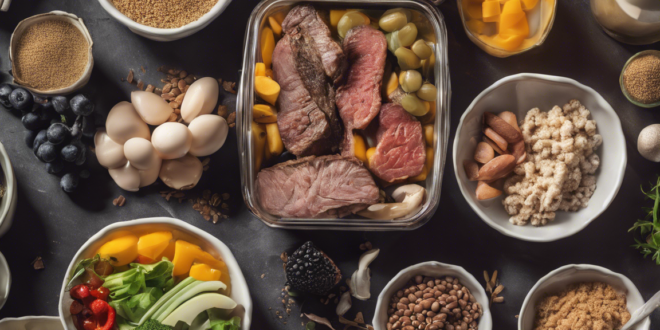Meal Plan Your Way to Plenty of Protein: A Comprehensive Guide to Optimal Nutrition
Protein is the building block of life, crucial for muscle growth, tissue repair, and overall health. Yet, many Americans struggle to incorporate the right amount of protein into their daily diet. This comprehensive guide will walk you through everything you need to know about protein intake, from understanding your body’s needs to creating a delicious and nutritious meal plan that keeps you energized and healthy.
Understanding Protein: More Than Just Muscle Building
Protein is a fundamental macronutrient that plays a critical role in numerous bodily functions. Beyond muscle development, protein supports immune function, helps create enzymes and hormones, and provides essential amino acids that your body cannot produce on its own. The recommended dietary allowance (RDA) for protein varies depending on age, sex, weight, and activity level, but generally ranges from 46 to 56 grams per day for most adults.
Calculating Your Personal Protein Needs
Determining the right amount of protein for your body isn’t a one-size-fits-all approach. Athletes and individuals with active lifestyles may require more protein than sedentary individuals. A general rule of thumb is to consume between 0.8 to 1.2 grams of protein per kilogram of body weight. For example, a 150-pound individual might aim for 54-82 grams of protein daily, depending on their activity level and fitness goals.
Protein Sources: Beyond Meat and Dairy
While animal proteins are complete protein sources, there are numerous options for everyone, including vegetarians and vegans. Here’s a breakdown of protein-rich foods across different dietary preferences:
Animal Protein Sources
– Chicken breast: 31 grams per 100 grams
– Salmon: 22 grams per 100 grams
– Eggs: 6 grams per large egg
– Greek yogurt: 15-20 grams per serving
– Lean beef: 26 grams per 100 grams
Plant-Based Protein Sources
– Tofu: 8 grams per 100 grams
– Lentils: 9 grams per 1/2 cup
– Quinoa: 8 grams per cup
– Chickpeas: 7 grams per 1/2 cup
– Almonds: 6 grams per ounce
Creating a Balanced Protein Meal Plan
A successful protein meal plan focuses on variety, balance, and consistent intake throughout the day. Here’s a sample one-day meal plan that provides approximately 80-100 grams of protein:
Breakfast (20-25 grams of protein)
– Greek yogurt parfait with berries and almonds
– Scrambled eggs with spinach
– Protein smoothie with whey or plant-based protein powder
Mid-Morning Snack (10-15 grams of protein)
– Hard-boiled eggs
– Protein bar
– Cottage cheese with fruit
Lunch (25-30 grams of protein)
– Grilled chicken salad
– Quinoa bowl with tofu
– Turkey and avocado sandwich on whole grain bread
Afternoon Snack (10-15 grams of protein)
– Protein shake
– Greek yogurt
– Hummus with vegetables
Dinner (25-30 grams of protein)
– Baked salmon with roasted vegetables
– Lean beef stir-fry with brown rice
– Lentil and vegetable curry
Protein Supplementation: When and How
While whole food sources are ideal, protein supplements can be beneficial for those with high activity levels, dietary restrictions, or difficulty meeting protein needs through food alone. Whey, casein, and plant-based protein powders offer convenient alternatives. However, it’s crucial to consult with a nutritionist or healthcare provider to determine individual needs.
Common Protein Intake Mistakes to Avoid
1. Consuming all protein in one meal
2. Neglecting protein quality and variety
3. Overlooking plant-based protein sources
4. Not adjusting protein intake with activity levels
5. Ignoring individual dietary needs and restrictions
Conclusion: Your Personalized Protein Journey
Developing a protein-rich diet is a personalized process that requires understanding your body’s unique needs. By focusing on diverse protein sources, balanced meal planning, and consistent nutrition, you can optimize your health, support muscle growth, and maintain overall wellness.
Disclaimer
Always consult with a registered dietitian or healthcare professional before making significant changes to your diet, especially if you have pre-existing health conditions or specific nutritional requirements.
 Good Calories Guide GoodCalories Guide focuses on nutrition, healthy eating, and overall wellness. The site offers practical insights into evidence-based dietary practices, including tips for specific lifestyles such as veganism, keto, and family-friendly meal planning. It also addresses unique nutritional needs for individuals with conditions like diabetes or food allergies, while providing quick and accessible recipes to make healthy living a sustainable and enjoyable choice.
Good Calories Guide GoodCalories Guide focuses on nutrition, healthy eating, and overall wellness. The site offers practical insights into evidence-based dietary practices, including tips for specific lifestyles such as veganism, keto, and family-friendly meal planning. It also addresses unique nutritional needs for individuals with conditions like diabetes or food allergies, while providing quick and accessible recipes to make healthy living a sustainable and enjoyable choice.


